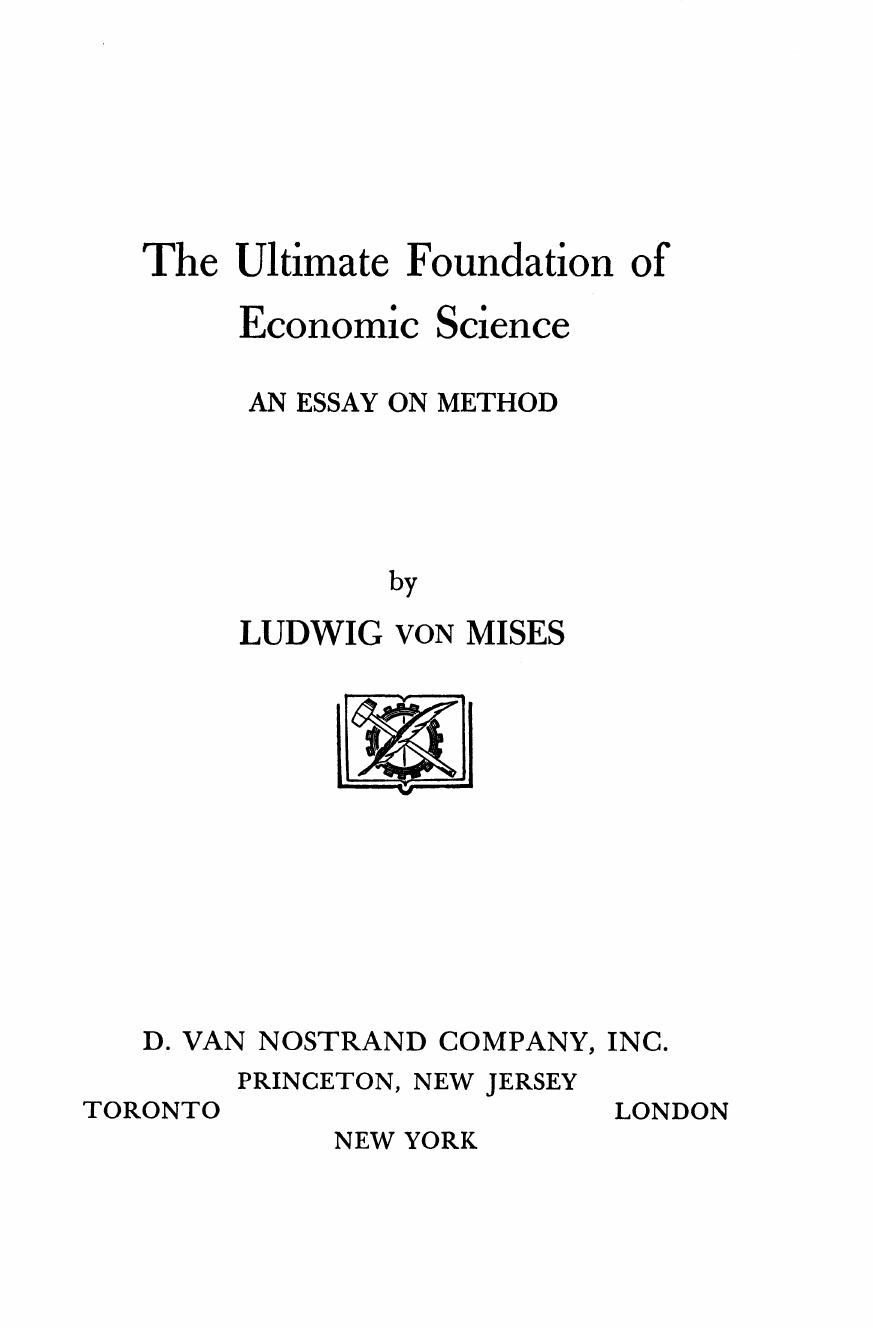The Ultimate Foundation of Economic Science by Ludwig von Mises

Author:Ludwig von Mises [von Mises, Ludwig]
Language: eng
Format: epub, pdf
Publisher: Mises Institute
Published: 2010-11-06T16:00:00+00:00
2. The Study of Motives
Public opinion still labors under the failure of classical economics to come to grips with the problem of value. Unable to solve the apparent paradox of valuation, the classical economists could not trace the chain of market transactions back to the consumer, but were forced to start their reasoning from the actions of the businessman, for whom the valuations of the buyers are a given fact. The conduct of the businessman in his capacity as a merchant serving the public is pertinently described by the formula: Buy in the cheapest and sell in the dearest market. The second part of this formula refers to the conduct of the buyers whose valuations determine the height of the prices they are prepared to pay for the merchandise. But nothing is said about the process that sets up these valuations. They are looked upon as given data. If one accepts this oversimplified formula, it is certainly possible to distinguish between businesslike conduct (falsely termed economic or rational conduct) and conduct determined by other considerations than those of business (falsely termed uneconomic or irrational conduct). But this mode of classification does not make any sense if we apply it to the behavior of the consumer.
The harm done by such and similar attempts to make distinctions was that they removed economics from reality. The task of economics, as many epigones of the classical economists practised it, was to deal not with events as they really happened, but only with forces that contributed in some not clearly defined manner to the emergence of what really happened. Economics did not actually aim at explaining the formation of market prices, but at the description of something that together with other factors played a certain, not clearly described role in this process. Virtually it did not deal with real living beings, but with a phantom, “economic man,” a creature essentially different from real man.
The absurdity of this doctrine becomes manifest as soon as the question is raised in what this economic man differs from real man. He is considered as a perfect egoist, as omniscient, and as exclusively intent upon accumulating more and more wealth. But it does not make any difference for the determination of market prices whether an “egoistic” buyer buys because he wants himself to enjoy what he bought or whether an “altruistic” buyer buys for some other reasons, for instance in order to make a gift to a charitable institution. Neither does it make any difference on the market whether the consumer in buying is guided by opinions that an unaffected spectator considers as true or false. He buys because he believes that to acquire the merchandise in question will satisfy him better than keeping the money or spending it for something else. Whether or not he aims at accumulating wealth, he always aims at employing what he owns for those ends which, as he thinks, will satisfy him best.
There is only one motive that determines all the actions of all men, viz.
Download
The Ultimate Foundation of Economic Science by Ludwig von Mises.pdf
This site does not store any files on its server. We only index and link to content provided by other sites. Please contact the content providers to delete copyright contents if any and email us, we'll remove relevant links or contents immediately.
International Integration of the Brazilian Economy by Elias C. Grivoyannis(109902)
The Radium Girls by Kate Moore(12017)
Turbulence by E. J. Noyes(8040)
Nudge - Improving Decisions about Health, Wealth, and Happiness by Thaler Sunstein(7690)
The Black Swan by Nassim Nicholas Taleb(7106)
Rich Dad Poor Dad by Robert T. Kiyosaki(6607)
Pioneering Portfolio Management by David F. Swensen(6288)
Man-made Catastrophes and Risk Information Concealment by Dmitry Chernov & Didier Sornette(6004)
Zero to One by Peter Thiel(5786)
Secrecy World by Jake Bernstein(4740)
Millionaire: The Philanderer, Gambler, and Duelist Who Invented Modern Finance by Janet Gleeson(4465)
The Age of Surveillance Capitalism by Shoshana Zuboff(4274)
Skin in the Game by Nassim Nicholas Taleb(4237)
The Money Culture by Michael Lewis(4198)
Bullshit Jobs by David Graeber(4179)
Skin in the Game: Hidden Asymmetries in Daily Life by Nassim Nicholas Taleb(3987)
The Dhandho Investor by Mohnish Pabrai(3758)
The Wisdom of Finance by Mihir Desai(3731)
Blockchain Basics by Daniel Drescher(3574)
